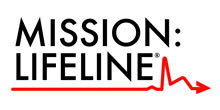
The American Heart Association's Mission: Lifeline program helps hospitals, emergency medical services and communities improve response times so people who suffer from a STEMI receive prompt, optimal treatment.
Emory University Hospital, Emory University Hospital Midtown and Emory Johns Creek Hospital have received the American Heart Association Mission: Lifeline® Silver Receiving Quality Achievement Award for achieving high standards in STEMI (ST-elevation myocardial infarction) heart attack care for 2013.
Each year in the United States, approximately 250,000 people have a STEMI heart attack, which is caused when a blood clot suddenly forms, completely blocking an artery in the heart. To prevent death or severe heart damage, it is critical to immediately perform a heart catheterization to mechanically open the blocked blood vessel and restore blood flow to the heart.
"We are proud to be recognized for our dedication and achievements in cardiac care," says Abhinav Goyal, MD, MHS, associate professor of medicine in the Division of Cardiology at Emory, and director of quality for cardiology at EUH and EUHM.
"This award reflects a key institutional commitment to improve the quality of care for our heart attack patients," adds Goyal. He is also co-chair of the Atlanta Mission: Lifeline Program.
The American Heart Association's Mission: Lifeline program helps hospitals, emergency medical services and communities improve response times so people who suffer from a STEMI receive prompt, optimal treatment. The program's goal is to streamline systems of care to quickly treat heart attack patients.
Since EMS providers are often the first medical responders to reach a heart attack victim, they represent a critical link in the chain of events that stop heart attacks. The program includes protocols that prompt EMS workers to do an electrocardiogram (ECG) in the field to look for signs of a STEMI heart attack.
"Our goal is to work with emergency responders to get patients to hospitals that are capable of opening a blocked artery within 90 minutes of their first medical contact," says Michael Ross, MD, professor of emergency medicine at Emory and immediate past co-chair of the Atlanta Mission: Lifeline Program.
"Starting this process in the field helps us to prepare for the patient's arrival by quickly activating the cath lab to unblock the artery. This saves heart muscle. When time is muscle, every minute counts."
For more information on Mission: Lifeline, visit heart.org/missionlifeline and heart.org/quality.
